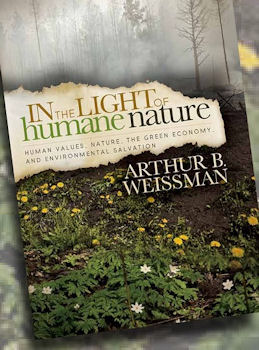
|
Posted September 19, 2014
Book: In the Light of Humane Nature: Human Values, Nature, The Green Economy, and Environmental Salvation Author: Arthur B. Weissman Morgan James. New York, 2014. Pp.123 An Excerpt from the Jacket:
In the Light of Humane Nature confronts one of the most critical problems of our time, the environmental crisis, but provides an alternative to the countless prescriptions that have already been offered. It proposes that the solution lies in returning to the core values within us. Readers are taken through key events in the green economy movement, focusing on the author's first-hand experiences and showing both the promise and the shortfall in our efforts to become a more sustainable society. This engaging and philosophical work gives hope that we might achieve a more sustainable world by connecting with our deepest, most humane values and expanding our moral and aesthetic outlook toward the world around us. An Excerpt from the Book: The drive for greater individual welfare cannot be underestimated in today's world. It is one of the most significant consumer concerns in developed countries. Advertising plays highly on this concern by enticing people to upgrade their lifestyle and self-image with ever greater material possessions and enhancements. One of the best tricks of advertising is to convince consumers that something they might have perceived as a luxury is really necessary for their lifestyle. A half-century ago the economist John Kenneth Galbraith showed how modern corporations create such demand on the part of consumers through pervasive advertising, so that the traditional notion of supply and demand no longer operates as a classic free market. Most of us recognize that this drive for greater individual welfare has gotten out of hand. Certainly, striving for a reasonably comfortable life is natural, and it is part of the culture of Western developed countries, particularly by the United States, where everyone wants to enhance their standard of living. But the ferocity of our growing materialism as well as the aberrations it has created (such as disparity of incomes, industrialized agriculture, rampant development, continued environmental degradation, and overstressed lives) have led to a growing movement to question prosperity for its own sake. This counter-movement is manifested in such trends as holistic health, slow food, telework, and community-based economies. Table of Contents: 1. Introduction and still the world burns 2. An historical perspective: from end of pipe to all of pipe 3. Responsible parties: who makes the economy green? 4. Common consumer concerns 5. Our moral relationship with nature 6. Now all is beautiful 7. Conclusion: the moral and aesthetic imperative' |
|
